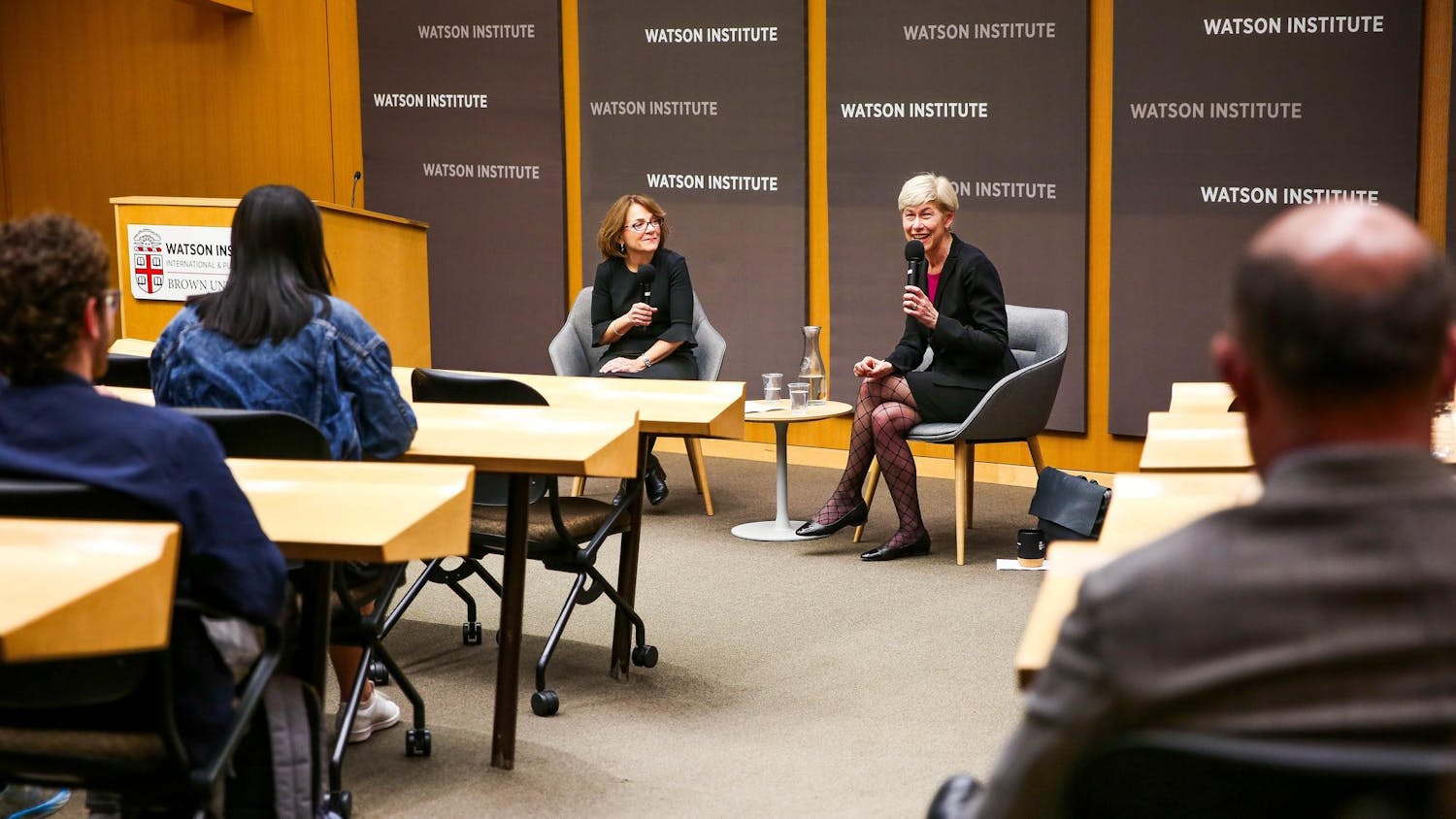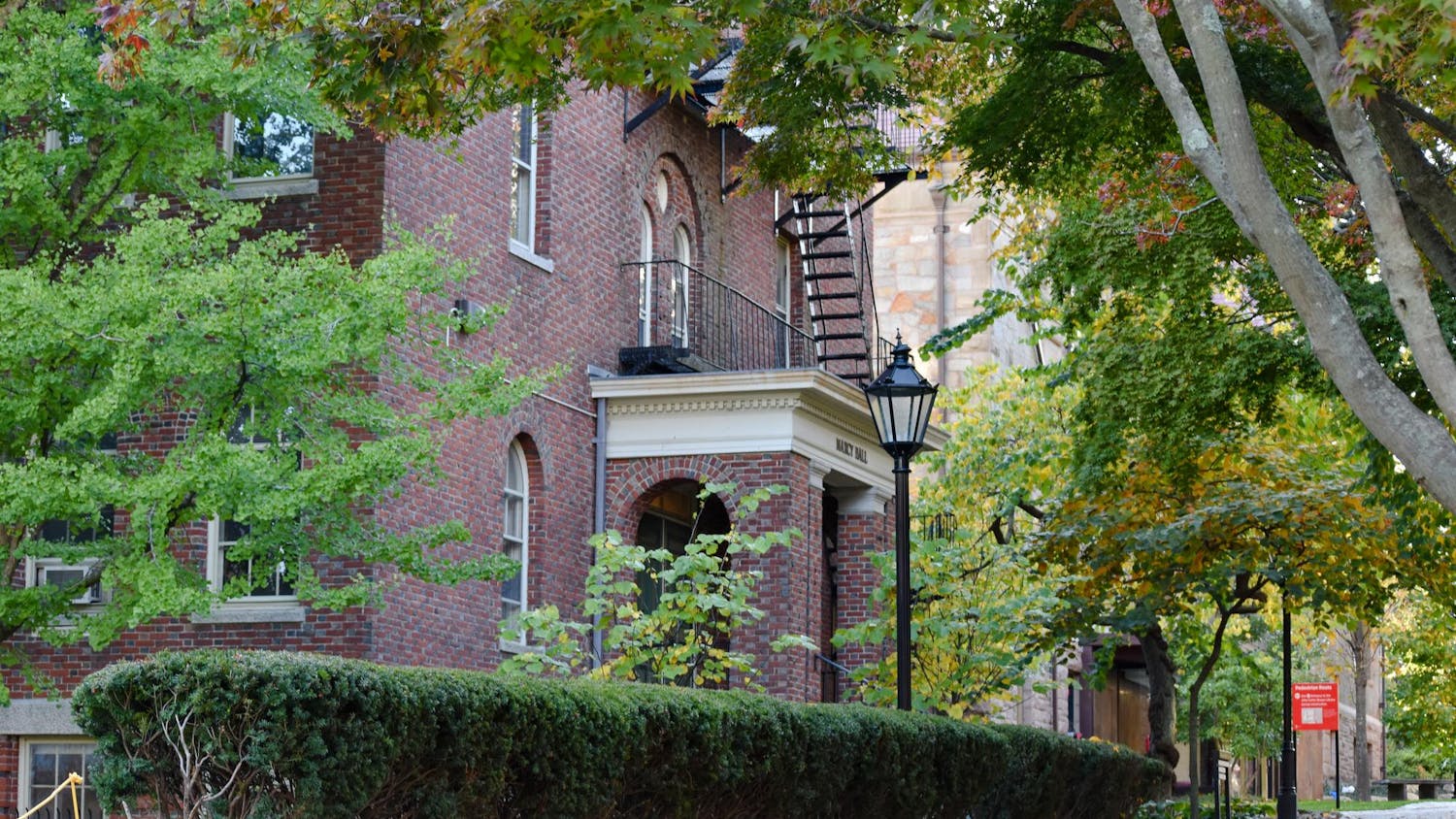From Serena van der Woodsen of "Gossip Girl," to Brian Griffin of "Family Guy," to the nearly 30,000 students that applied for admission this fall, it seems like everyone wants to go to Brown.
With myriad popular culture references and a couple well-known students over the years — not to mention, of course, Brown's reputation as a selective Ivy League institution with very happy students — it's no surprise that a spot in the class of 2014 is in high demand. But with this year's unprecedented 20.6 percent jump in undergraduate applications, is Brown simply "in" at the moment? And what's more, will this trend pass or is this welcomed increase in interest here to stay?
Colleges can catch momentary waves of popularity, and increased media attention does help spread the Brown name. But students, admissions officers, alums and higher education experts all agree that Brown's increase in applications isn't caused — at least not fully — by popular trends. Instead, they say, the increase is due to enduring qualities like the University's friendly environment, liberating curriculum and reputation as an academically rigorous institution.
‘An enclave of trustafarians'
Last week, over 700 admitted students visited Brown for A Day on College Hill. Sitting beneath a packed white tent on the Main Green, they — like thousands before them — laughed along with a 15-minute video clip that proves Brown is no stranger to showing up in popular culture. From "The Simpsons" and "Family Guy" to "The O.C." and "Gossip Girl," television shows popular with high school students love sending their characters to Brown.
"The O.C.," FOX's hit drama running from 2003 to 2007, heavily featured Brown. In the first three seasons, main character Seth Cohen — a pot-smoking, geeky, comic book lover with a witty sense of humor — had his sights set on Brown. Yet in a plot twist, Seth is denied admission, and instead, Summer Roberts — his superficial, valley-girl girlfriend — is offered a spot.
The show's final season features Summer's life at Brown, where she befriends Winchester "Che" Cook, a left-wing environmentalist student.
In a YouTube spoof of the show — "paid for by Brunonians for Enhanced Animal Karma" — Che is nominated as a candidate for student body president because he is "a dedicated environmentalist … friend to animals … keen on diversity … and a protest musician."
Cory Hargus '13 said the image of Brown presented by "The O.C." piqued his interest in the University, even if the image was a bit stereotypical.
"Watching these shows as a high school kid, I was like, ‘Damn, I wanna go there,' " Hargus said. "The show gives an image of Brown as a kind of unique university with a non-snooty feel. It's really progressive, socially liberal and open-minded."
Yet not all shows present Brown in such a flattering light. On "Gossip Girl," a popular CW show, New York socialite Serena vies for a spot at Brown.
Yesenia Vidal '13, a fan of the show, remembers watching an episode last year where Serena and Blair Waldorf, both of whom are about to tour colleges, argue over Brown's respectability as an Ivy League institution.
Blair, who wants to go to Yale, calls Brown "an enclave of trustafarians" — a portmanteau of Rastafarian and trust-funder — "and children of celebrities that major in drum circles and semiotics." When Serena reminds her that Brown is part of the Ivy League, Waldorf responds that "the only real Ivies are the holy trinity: Harvard, Yale and Princeton." Before leaving, Blair tells Providence-bound Serena, "Maybe you can get your hair dreadlocked while you're there."
Vidal said Brown's stereotype in the show didn't make it less attractive to her.
"Friends would ask me if I was sure I wanted to go to such a ‘hippie' school," she said, "but personally, it didn't affect me. You're going to see that stereotype here, but it's not the only thing."
On the other hand, Vidal said, Brown's presence in pop culture "made it so much cooler."
"Gossip Girl" isn't the only show that questions Brown's academic rigor. In the clip shown to prospective students at ADOCH, Lisa from "The Simpsons" is told by Harvard's president after she fails a test that she will be unable to attend Harvard, but he can "pass (her) file along to Brown."
Incoming student Alexandria Sharpe '14 wrote in an e-mail to The Herald that she saw Brown mentioned in the HBO show "How to Make It in America," which focuses on two young men trying to succeed in New York's fashion scene.
Sharpe wrote that in a recent episode, a Brown graduate "showed up late for a meeting and her business partner in the scene said he thought they taught her about being on time at Brown."
‘Any press is good press'
But it's debatable whether Brown's presence in pop culture helps attract students, or if stereotypes give prospective students the wrong idea.
David Hawkins, director of public policy at the National Association for College Admission Counseling, said prominent schools can be set back at times by the images tied to their names — which are out of the hands of admissions officers.
"The idea that any press is good press is really put to the test in admissions offices," he said. "Stereotypes cause the admissions office to have to work really hard for the full picture of the institution to be shown."
Dean of Admission Jim Miller '73 said the stereotype he most often has to combat is the idea that, because of the New Curriculum, Brown is not as academically rigorous as its peers. Miller said he has to emphasize — especially to parents — that the curriculum has "opportunities and rigor embedded" in it and because of its freedom it allows students to be "intellectually entrepreneurial."
Miller added that fighting stereotypes presented in popular culture is something the Admission Office will always have to deal with. The best way to do this, he said, is to "keep repeating the realities about Brown."
"We have to do a very good job to communicate to applicants because they get so much information out there," he said. "There is a lot of noise around college talk, but ultimately facts will outweigh the myths."
And that's why, Hawkins said, he does not see pop culture references as a bad thing. They "can serve to spread information of institutions to interested students," he said, something schools are always trying to do.
Hargus said he thinks that the negative stereotypes shown in these shows ultimately don't affect the schools' overall reputation to applicants. "Brown is obviously a good school to start with, so that's what's really important," he said.
"If you're in popular media and in the back of people's minds, that's not totally a bad thing," Miller said.
Spotted at Brown
A parent who recently took an admissions tour wrote a summary of her time at Brown in the Washington Post blog "The Answer Sheet." Before even stating the name of the school, she mentioned one thing — celebrities.
"People go there looking for Emma Watson ('13). And if they can't find Emma Watson, they want Scout Willis ('13), and if they can't find Scout Willis, they look for other people on the celebrity list," the parent wrote. "Brown is known for that."
The claim that Brown is "known" for admitting celebrity students is often brought up by critics and challenged by faculty. According to Miller, since the admission of John Kennedy Jr. '83 — possibly Brown's first "celebrity student" — celebrity presence at Brown has "stayed with our image."
Pulitzer Prize-winning Wall Street Journal writer Daniel Golden claimed that admission officers at Brown lower their standards for applicants from celebrity families in his 2006 book "The Price
of Admission." Golden wrote that — more than any other university — Brown sought applicants with celebrity status in order to increase its endowment through donations. In a 2006 interview with The Herald, Golden said though he didn't think there was a "huge number" of celebrity students at Brown, he still thought his "portrayal of the admissions policy is accurate."
Miller said that he didn't think "we have an enormous amount of celebrity students."
But from incoming freshmen to alumni, Brunonians interviewed by The Herald agreed that having even a small celebrity presence does make the school better known. David Laidlaw '83, professor of computer science, said he felt having Kennedy as a classmate "made a difference because it drew more attention to the school."
Students today said they feel the same way. Alexa Steuer '14 said that Watson invariably came up every time she would tell her friends she was going to Brown.
"Emma Watson being a student at Brown definitely made an impression on people," she wrote in an e-mail to The Herald, "but it wasn't what shaped my decision to apply."
Having big-name students helps the University by raising attention and getting more prospective students interested in Brown, Vidal said. She said she wouldn't be surprised if "people might hear about Emma and read up on Brown."
Ultimately, Hawkins said, while "Brown has developed a reputation of attracting celebrity students," he doesn't think that translates to higher application numbers.
"While I don't doubt that having celebrity students helps, I doubt any student that thinks of enrolling really bases it all on celebrities," he said.
Associate Dean of the College Carol Cohen '83, also Kennedy's classmate, said that in the end it's not the celebrities, but the school, that brings in applicants.
"If Brown didn't have a good academic image, it wouldn't have mattered if JFK (Jr.) was here," she said.
‘Dream school'
While always placing high academically, Brown is probably best known for being at the top of student-life rankings, especially as the school with the "Happiest Students," according to the Princeton Review's 2010 edition of "The Best 371 Colleges."
Miller said the happiness at Brown — highlighted in these rankings — resonates well with applicants and helps Brown stand out against peer institutions with higher academic rankings.
"When the country is under stress," he said, "you want a positive space."
More recently, the Princeton Review placed Brown on the "Top Ten Dream Schools" list for both parents and students. The "Dream School" ranking, like all of its other rankings, was "based solely on student and parent response," said Rebecca Lessem, senior editor of "The Best 371 Colleges." Lessem said both students and parents were asked what school they would choose regardless of financial or admission considerations. Brown placed fifth in the students' list and eighth in the parents' list.
While this ranking is "a good measure of where students would like to be," Lessem said she doesn't believe that any one ranking — or any pop culture reference or celebrity student — should be the primary reason for students to apply to Brown. Instead, she said, "students need to look at every aspect."
Just a trend?
While Brown could be considered a trendy school, prospective students said that is not the reason why they are choosing to attend Brown and certainly not the most exciting thing the school has to offer.
Steuer, the incoming student, wrote that, at least where she lives, she has felt Brown's popularity rise.
"Just in Northern (New) Jersey alone, many more people that I have spoken to or heard about have applied to Brown," she said, "whereas in the past, I had not really heard of Brown really being on the map."
"The thought of choosing a college to go to on the basis of it being trendy or ‘in' has never crossed my mind," Annette Lopez '14, an incoming freshman, wrote in an e-mail to The Herald.
"Neither ‘ranking' nor ‘image/trendiness' is more important," she wrote. "No matter what rank, I feel Brown is where I belong."
Even the parent so enthusiastic about famous students in the Washington Post blog concluded it was the New Curriculum, and not the celebrities, that really matters.
"But we loved Brown because there are no requirements," the parent wrote. "It could be an ideal place for someone who doesn't know what they want to take but has a strong level of intellectual curiosity."
So while fads do come and go, Brown's longer lasting academic appeal is what counts, Hawkins said.
"I do think as in any marketplace, there are trends," he said. "But Brown's reputation as an excellent and good institution is not subject to these trends, and in that sense it will always be popular."




